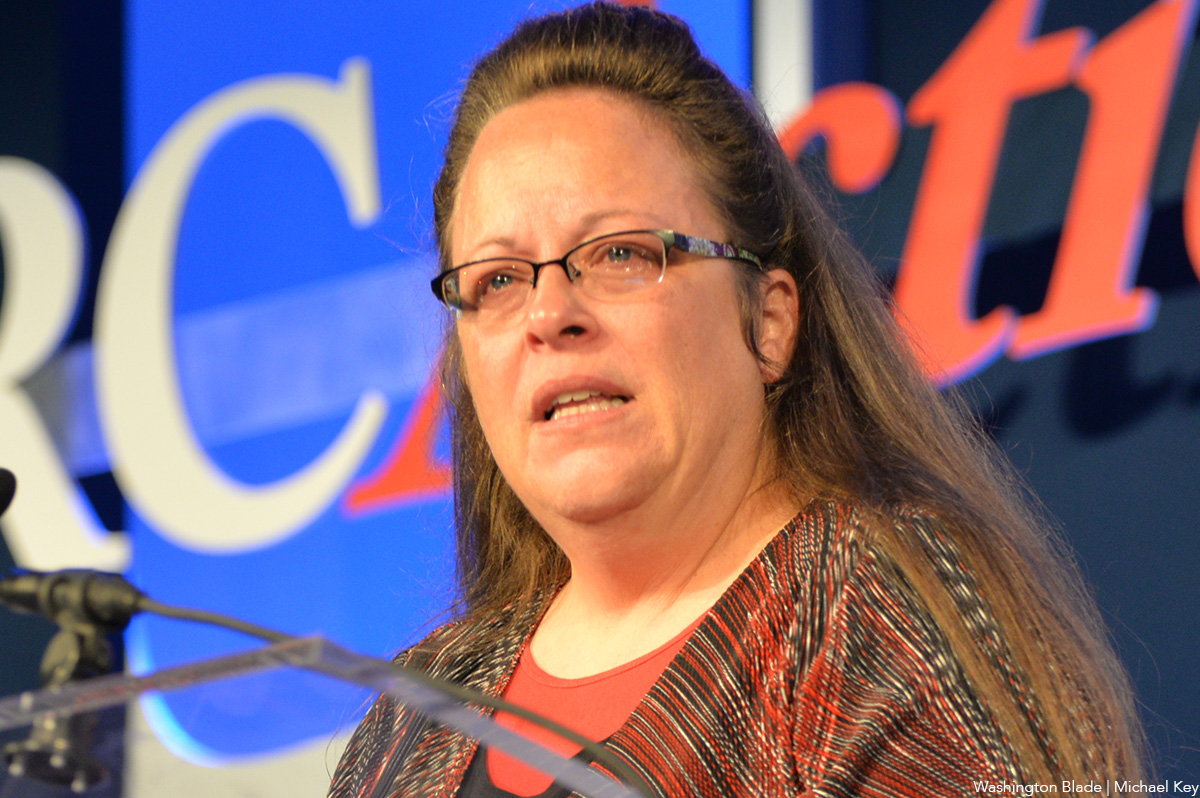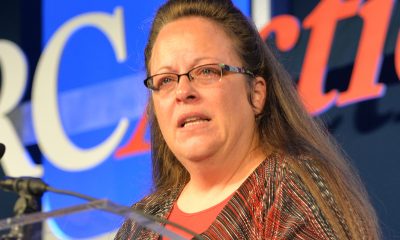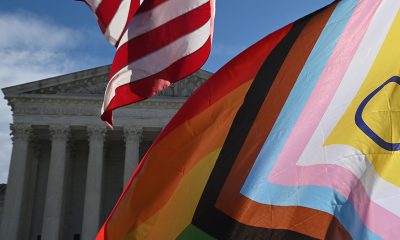National
Lesbian veteran seeks spousal benefits in lawsuit
Plaintiff served 12 years in Iraq, Afghanistan

An organization dedicated to fighting hate and bigotry on Wednesday filed a lawsuit in federal court aimed at winning benefits for a disabled Army veteran and her same-sex spouse.
The lawsuit, known as Cooper Harris v. United States, was filed by the Southern Poverty Law Center against the U.S. government and is pending before the U.S. District Court of Central District of California. Wilmer, Cutler, Pickering, Hale, & Dorr is assisting with the case on a pro-bono basis.
Tracey Cooper-Harris, the named plaintiff in the lawsuit, criticized the current law, which prevents her and her spouse Maggie from receiving spousal benefits that flow to veterans in opposite-sex marriages.
“We’re only asking for the same benefits as other married couples,” Tracey said. “We simply want the same peace of mind that these benefits bring to the families of other disabled veterans. And that is why we filed a federal lawsuit challenging this policy. No family should have to go through what we’ve had to experience, and our nation shouldn’t allow the Defense of Marriage Act to deny the last wishes of our veterans, but it is happening.”
Tracey served for 12 years in support of military operations in Afghanistan and Iraq and received more than two dozen medals and commendations before being honorably discharged in 2003. In 2008, she married Maggie in California before Proposition 8 took away marriage rights for gay couples in that state.
After being diagnosed in 2010 with multiple sclerosis, which the Department of Veterans Affairs has determined is connected to her military service, Tracey began receiving disability benefits as a veteran. However, she’s unable to receive spousal benefits that she would otherwise be entitled to if she were in an opposite-sex marriage.
Among the veterans benefits that are denied to the couple are disability benefits the Department of Veterans Affairs extends to veterans in opposite-sex marriages meant to ensure the financial stability of spouses. The couple also won’t be permitted to be buried together in a national veterans cemetery.
The lawsuit seeks to strike down Title 38, which denies partner benefits to veterans if they’re married to someone of the same-sex, and the Defense of Marriage Act, which prohibits federal recognition of same-sex marriage. SPLC contends the laws are unconstitutional on the basis that they violate the equal protection clause of the Fifth Amendment.
Joseph Levin, SPLC’s co-founder, said during the news conference that the lawsuit has parallels to another lawsuit his organization fought and won in the 1970s on behalf of Air Force Lt. Sharron Frontiero.
As a result of the lawsuit, known as Frontiero v. Richardson, the U.S. Supreme Court ruled that female veterans should have the same access to benefits as their male counterparts. Levin said the discrimination faced at that time is similar to that faced by the plaintiffs now.
“These men and women made the same and endured the same sacrifices as other members of the military, yet this policy devalues their service, commitment and sacrifice,” Levin said.
Frontiero, who was also present at the news conference, said the lawsuit on behalf of Cooper-Harris is “a logical extension of the case” filed 40 years ago.
“Tracey is fighting the same battle I fought, which is not to have our work deemed second rate or second best,” Frontiero said. “We serve like everybody else, and we deserve what everybody else is getting.”
Levin said after SPLC won the Frontiero case in 1970s, Congress changed the statutes related to military benefits to define spouse as a person of the opposite-sex to ensure female veterans would have access to spousal benefits.
“I never dreamed that statutes we helped change would be used to discriminate against the LGBT community,” Levin said.
Christine Sun, SPLC’s deputy legal director, emphasized the unfairness that Tracey and Maggie face under current law.
“Refusing to grant these benefits to Tracey and Maggie solely because of their sexual orientation is unpatriotic and un-American,” Sun said. “The unfortunate fact is that our nation is not serving our gay and lesbian service members as well as they served us.”
In a response to a question from the Washington Blade, Sun said she couldn’t predict when the district court would make a decision in the case; the soonest the case would come to the U.S. Supreme Court is three or four years.
Neither the Justice Department nor the Department of Veterans Affairs responded on short notice to the Washington Blade’s request for comment on the litigation. In February, the White House announced the Obama administration would no longer defend the Defense of Marriage Act in court.
The litigation is similar to a case that the Servicemembers Legal Defense Network filed at the start of the year known as McLaughlin v. United States, which also seeks to overturn DOMA on the basis that it bars federal benefits from flowing to LGBT military families.
Aubrey Sarvis, SLDN’s executive director, said in a statement his organization welcomes to the SPLC lawsuit and looks forward to coordinating efforts going forward.
“We have worked with the plaintiff, Tracey Cooper-Harris, in the past, and we believe that her case is compelling,” Sarvis said. “This filing today advances the cause of equality for gay and lesbian service members and veterans.”
U.S. Military/Pentagon
Serving America, facing expulsion: Fight for trans inclusion continues on Veterans Day
Advocates sue to reverse Trump ban while service members cope with new struggles

President Trump signed EO 14183, titled “Prioritizing Military Excellence and Readiness,” on Jan. 27, directing the Department of Defense (DoD) to adopt policies that would prohibit transgender, nonbinary, and gender-nonconforming people from serving in the military.
The Trump-Vance administration’s policy shift redefines the qualifications for military service, asserting that transgender people are inherently incapable of meeting the military’s “high standards of readiness, lethality, cohesion, honesty, humility, uniformity, and integrity,” citing a history or signs of gender dysphoria. According to the DoD, this creates “medical, surgical, and mental health constraints on [an] individual.” Regardless of their physical or intellectual capabilities, transgender applicants are now considered less qualified than their cisgender peers.
On Jan. 28, 2025, GLBTQ Legal Advocates and Defenders (GLAD) Law and the National Center for LGBTQ Rights (NCLR) filed Talbott v. Trump, a federal lawsuit in the U.S. District Court for the District of Columbia challenging the executive order. Originally filed on equal protection grounds on behalf of six active service members and two individuals seeking enlistment, the case has since grown to include 12 additional plaintiffs.
The Washington Blade spoke exclusively with Second Lt. Nicolas (Nic) Talbott, U.S. Army, a plaintiff in the case, and with Jennifer Levi, Senior Director of Transgender and Queer Rights at GLAD Law, who is leading the litigation.
For Talbott, serving in the military has been a lifelong aspiration, one he pursued despite the barriers posed by discriminatory policies.
“Being transgender posed quite the obstacle to me achieving that dream,” Talbott told the Blade. “Not because it [being trans] had any bearing on my ability to become a soldier and meet the requirements of a United States soldier, but simply because of the policy changes that we’ve been facing as transgender service members throughout the course of the past decade… My being transgender had nothing to do with anything that I was doing as a soldier.”
This drive was fueled by early life experiences, including the impact of the Sept. 11 terrorist attacks, which shaped his desire to protect his country.
“Even for an eight-year-old kid, [9/11] has a tremendous amount of impact… I remember thinking, you know, this is a terrible thing. Me, and when I grow up, I want to make sure nothing like this ever happens again,” he said. “I’ve still tried to gear my life in a way that I can be preparing myself to eventually help accomplish that mission of keeping America safe from anything like that ever happening again.”
The attacks inspired countless Americans to enlist; according to the New York City government, 181,510 joined active duty and 72,908 enlisted in the reserves in the year following 9/11. Although Talbott was too young to serve at the time, the events deeply influenced his educational and career path.
“For me, [9/11] just kind of helped shape my future and set me on the path that I’m currently on today,” he added. “It ignited my passion for the field, and it’s something that you know, I’ve carried with me into my adult life, into my professional life, and that I hope to have a career in the future.”
Talbott holds a master’s degree in criminology with a focus on counterterrorism and global security, and while completing his degree, he gained practical experience working with the Transportation Security Administration.
Despite the public scrutiny surrounding the lawsuit and the ongoing uncertainty of his military future, Talbott remains grounded in the values that define military service.
“Being so public about my involvement with this lawsuit grants me the very unique opportunity to continue to exemplify those values,” Talbott said. “I’m in a very privileged spot where I can speak relatively openly about this experience and what I’m doing. It’s very empowering to be able to stand up, not only for myself, but for the other transgender service members out there who have done nothing but serve with honor and dignity and bravery.”
The ban has created significant uncertainty for transgender service members, who now face the possibility of separation solely because of their gender identity.
“With this ban… we are all [trans military members] on track to be separated from the military. So it’s such a great deal of uncertainty… I’m stuck waiting, not knowing what tomorrow might bring. I could receive a phone call any day stating that the separation process has been initiated.”
While the Department of Defense specifies that most service members will receive an honorable discharge, the policy allows for a lower characterization if a review deems it warranted. Compensation and benefits differ depending on whether service members opt for voluntary or involuntary separation. Voluntary separation comes with full separation pay and no obligation to repay bonuses, while involuntary separation carries lower pay, potential repayment of bonuses, and uncertain success in discharge review processes.
Healthcare coverage through TRICARE continues for 180 days post-discharge, but reduced benefits, including VA eligibility, remain a concern. Those with 18–20 years of service may qualify for early retirement, though even this is not guaranteed under the policy.
Talbott emphasized the personal and professional toll of the ban, reflecting on the fairness and capability of transgender service members.
“Quite frankly, the evidence that we have at hand points in the complete opposite direction… there are no documented cases that I’m aware of of a transgender person having a negative impact on unit cohesion simply by being transgender… Being transgender is just another one of those walks of life.”
“When we’re losing thousands of those qualified, experienced individuals… those are seats that are not just going to be able to be filled by anybody … military training that’s not going to be able to be replaced for years and years to come.”
Talbott also highlighted the unique discipline, dedication, and value of diversity that transgender service members bring—especially in identifying problems and finding solutions, regardless of what others think or say. That, he explained, was part of his journey of self-discovery and a key reason he wants to continue serving despite harsh words of disapproval from the men leading the executive branch.
“Being transgender is not some sad thing that people go through… This is something that has taken years and years and years of dedication and discipline and research and ups and downs to get to the point where I am today… my ability to transition was essential to getting me to that point where I am today.”
He sees that as an asset rather than a liability. By having a more diverse, well-rounded group of people, the military can view challenges from perspectives that would otherwise be overlooked. That ability to look at things in a fresh way, he explained, can transform a good service member into a great one.
“I think the more diverse our military is, the stronger our military is… We need people from all different experiences and all different perspectives, because somebody is going to see that challenge or that problem in a way that I would never even think of… and that is what we need more of in the U.S. military.”
Beyond operational effectiveness, Talbott emphasized the social impact of visibility and leadership within the ranks. Fellow soldiers often approached him for guidance, seeing him as a trusted resource because of his transgender status.
“I can think of several instances in which I have been approached by fellow soldiers… I feel like you are a person I can come to if I have a problem with X, Y or Z… some people take my transgender status and designate me as a safe person, so to speak.”
With the arrival of Veterans Day, the Blade asked what he wishes the public knew about the sacrifices of transgender service members. His answer was modest.
“Every person who puts on the uniform is expected to make a tremendous amount of sacrifice,” Talbott said. “Who I am under this uniform should have no bearing on that… We shouldn’t be picking and choosing which veterans are worthy of our thanks on that day.”
Jennifer Levi, GLAD Law’s Senior Director of Transgender and Queer Rights, also spoke with the Blade and outlined the legal and human consequences of the ban. This is not Levi’s first time challenging the executive branch on transgender rights; she led the legal fight against the first Trump administration’s military ban in both Doe v. Trump and Stockman v. Trump.
Levi characterized the policy as overtly cruel and legally indefensible.
“This policy and its rollout is even more cruel than the first in a number of ways,” Levi explained. “For one, the policy itself says that transgender people are dishonest, untrustworthy and undisciplined, which is deeply offensive and degrading and demeaning.”
She highlighted procedural abuses and punitive measures embedded in the policy compared to the 2017 ban.
“In the first round the military allowed transgender people to continue to serve… In this round the military policy purge seeks to purge every transgender person from military service, and it also proposes to do it in a very cruel and brutal way, which is to put people through a process… traditionally reserved for kicking people out of the military who engaged in misconduct.”
Levi cited multiple examples of discrimination, including the revocation of authorized retirements and administrative barriers to hearings.
She also explained that the administration’s cost argument is flawed, as removing and replacing transgender service members is more expensive than retaining them.
“There’s no legitimate justification relating to cost… it is far more expensive to both purge the military of people who are serving and also to replace people… than to provide the minuscule amount of costs for medications other service members routinely get.”
On legal grounds, Levi noted the ban violates the Equal Protection Clause.
“The Equal Protection Clause prevents laws that are intended to harm a group of people… The doctrine is rooted in animus, which means a bare desire to harm a group is not even a legitimate governmental justification.”
When asked what she wishes people knew about Talbott and other targeted transgender military members, Levi emphasized their extraordinary service.
“The plaintiffs that I represent are extraordinary… They have 260 years of committed service to this country… I have confidence that ultimately, this baseless ban should not be able to legally survive.”
Other organizations have weighed in on Talbott v. Trump and similar lawsuits targeting transgender service members.
Human Rights Campaign Foundation President Kelley Robinson criticized the ban’s impact on military readiness and highlighted the counterintuitive nature of removing some of the country’s most qualified service members.
“Transgender servicemembers serve their country valiantly, with the same commitment, the same adherence to military standards and the same love of country as any of their counterparts,” Robinson said. “This ban by the Trump administration, which has already stripped transgender servicemembers of their jobs, is cruel, unpatriotic, and compromises the unity and quality of our armed forces.”
Lambda Legal Senior Counsel Sasha Buchert echoed the legal and moral imperative to reverse the policy.
“Every day this discriminatory ban remains in effect, qualified patriots face the threat of being kicked out of the military,” she said. “The evidence is overwhelming that this policy is driven by animus rather than military necessity… We are confident the court will see through this discriminatory ban and restore the injunction that should never have been lifted.”
The White House
Trump targets LGBTQ workers in new loan forgiveness restrictions
A new Trump policy attempts to limit loan forgiveness for federal workers working with LGBTQ issues.

The Trump-Vance administration is moving forward with plans to restrict federal workers from using the Public Service Loan Forgiveness (PSLF) program if their work involves issues related to LGBTQ individuals, immigrants, or transgender children.
Lawsuits were filed last week in more than 20 cities — including Albuquerque, N.M., Boston, Chicago, and San Francisco — challenging the administration’s efforts to withhold loan forgiveness from organizations that oppose the president and his party’s political agenda.
Created by Congress in 2007 and signed into law by then-President George W. Bush, PSLF cancels the federal student loan debts of borrowers who spend a decade or more working in public service. The program covers teachers, nurses, law enforcement officers (including members of the military), and employees of tax-exempt organizations under Section 501(c)(3). Many of those who work to support LGBTQ rights are employed by such organizations — meaning they stand to lose eligibility under the new policy.
As of 2024, more than 1 million Americans have benefited from PSLF, helping erase an estimated $74 billion in student loan debt, according to a Biden-era estimate.
Under the new rule, which takes effect July 1, 2026, the Department of Education will be able to deny loan forgiveness to workers whose government or nonprofit employers engage in activities deemed to have a “substantial illegal purpose.” The power to define that term will rest not with the courts, but with the education secretary.
The rule grants the secretary authority to exclude groups from the program if they participate in activities such as trafficking, illegal immigration, or what it calls the “chemical castration” of children — defined as the use of hormone therapy or puberty-blocking drugs, a form of gender-affirming care sometimes provided to transgender children and teens.
Under Secretary of Education Nicholas Kent defended the change, arguing that the new rule would better serve the American people, despite every major American physician organization research showing gender-affirming care helps more than it harms.
“It is unconscionable that the plaintiffs are standing up for criminal activity,” Kent said in a statement to NPR. “This is a commonsense reform that will stop taxpayer dollars from subsidizing organizations involved in terrorism, child trafficking, and transgender procedures that are doing irreversible harm to children.”
The Williams Institute, a leading research center on sexual orientation and gender identity law and public policy, warned that this — along with other restrictions on federal loan forgiveness — would disproportionately harm LGBTQ Americans. The institute found that more than one-third (35%) of LGBTQ adults aged 18 to 40 — an estimated 2.9 million people — hold over $93.2 billion in federal student loans. About half (51%) of transgender adults, 36% of cisgender LBQ women, and 28% of cisgender GBQ men have federal student loans.
“The proposed restrictions on student loans will particularly affect the nearly one-quarter of LGBTQ adults employed in the public or nonprofit sectors, which qualify for the Public Student Loan Forgiveness program,” said Brad Sears, Distinguished Senior Scholar of Law and Policy at the Williams Institute, who authored a brief on how the proposed changes could impact LGBTQ borrowers. “A recent executive order could potentially disqualify anyone working for an organization involved in gender-affirming care, or possibly those serving transgender individuals more broadly, from the PSLF program.”
U.S. Supreme Court
Supreme Court rejects Kim Davis’s effort to overturn landmark marriage ruling
Justices declined to revisit the Obergefell decision

The U.S. Supreme Court has declined to hear an appeal from Kim Davis, the former Rowan County, Ky., clerk best known for refusing to issue marriage licenses to same-sex couples after the landmark 2015 Obergefell v. Hodges decision legalized same-sex marriage nationwide.
Following the Obergefell ruling, Davis stopped issuing marriage licenses altogether and has since filed multiple appeals seeking to challenge same-sex marriage protections. The court once again rejected her efforts on Monday.
In this latest appeal, Davis sought to overturn a $100,000 monetary award she was ordered to pay to David Moore and David Ermold, a same-sex couple to whom she denied a marriage license. Her petition also urged the court to use the case as a vehicle to revisit the constitutional right to same-sex marriage.
The petition, along with the couple’s brief in opposition, was submitted to the Supreme Court on Oct. 22 and considered during the justices’ private conference on Nov. 7. Davis needed at least four votes for the court to take up her case, but Monday’s order shows she fell short.
Cathy Renna, the director of communications for the National LGBTQ Task Force, a non-profit organization that works towards supporting the LGBQ community through grassroots organizing told the Washington Blade:
“Today’s decision is not surprising given the longshot status of Davis’s claim, but it’s a relief that the Supreme Court will not hear it, given the current make up of the court itself. We hope that this settles the matter and marriage equality remains the law of the land for same-sex couples.”
Human Rights Campaign President Kelley Robinson released the following statement:
“Today, love won again. When public officials take an oath to serve their communities, that promise extends to everyone — including LGBTQ+ people. The Supreme Court made clear today that refusing to respect the constitutional rights of others does not come without consequences.
Thanks to the hard work of HRC and so many, marriage equality remains the law of the land through Obergefell v. Hodges and the Respect for Marriage Act. Even so, we must remain vigilant.
It’s no secret that there are many in power right now working to undermine our freedoms — including marriage equality — and attack the dignity of our community any chance they get. Last week, voters rejected the politics of fear, division, and hate, and chose leaders who believe in fairness, freedom, and the future. In race after race, the American people rejected anti-transgender attacks and made history electing pro-equality candidates up and down the ballot.
And from California to Virginia to New Jersey to New York City, LGBTQ+ voters and Equality Voters made the winning difference. We will never relent and will not stop fighting until all of us are free.”
The Log Cabin Republicans, a organization dedicated to conservative LGBTQ people, praising the Court’s decision.
“After months of hand-wringing and fear-mongering by Gay Inc., Democrats, and the media, the conservative majority on the Supreme Court sided with the American people and common sense and declined to revisit marriage equality,” Interim Executive Director Ed Williams said in a statement. “Just like Justice Amy Coney Barrett hinted at earlier this year, Obergefell is settled. Marriage equality has been, and will continue to be, the law of the land.”
This story is developing and will be updated as more information becomes available.
-

 U.S. Supreme Court2 days ago
U.S. Supreme Court2 days agoSupreme Court rejects Kim Davis’s effort to overturn landmark marriage ruling
-

 U.S. Supreme Court4 days ago
U.S. Supreme Court4 days agoLGBTQ legal leaders to Supreme Court: ‘honor your precedent, protect our families’
-

 Pennsylvania4 days ago
Pennsylvania4 days agoErica Deuso elected as Pa.’s first openly transgender mayor
-

 Out & About5 days ago
Out & About5 days agoGala Hispanic Theatre’s Flamenco Festival returns

















